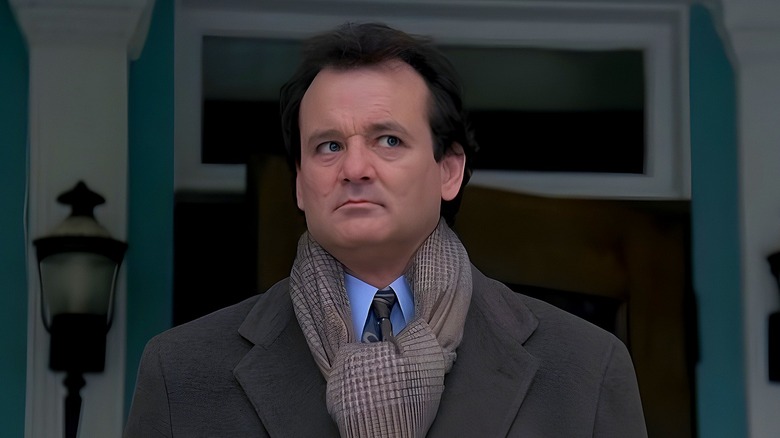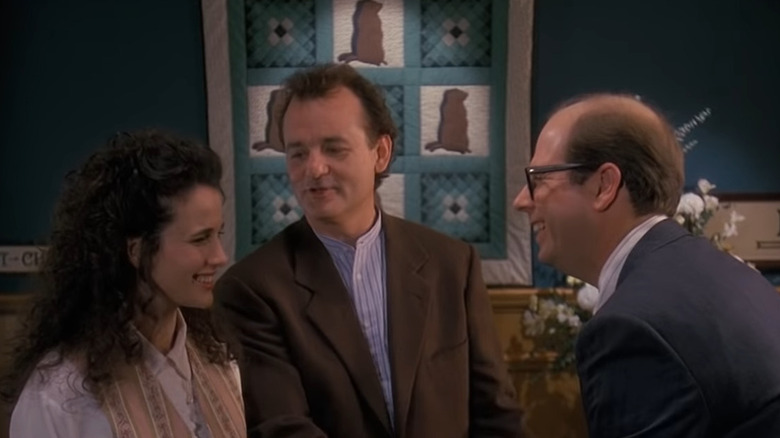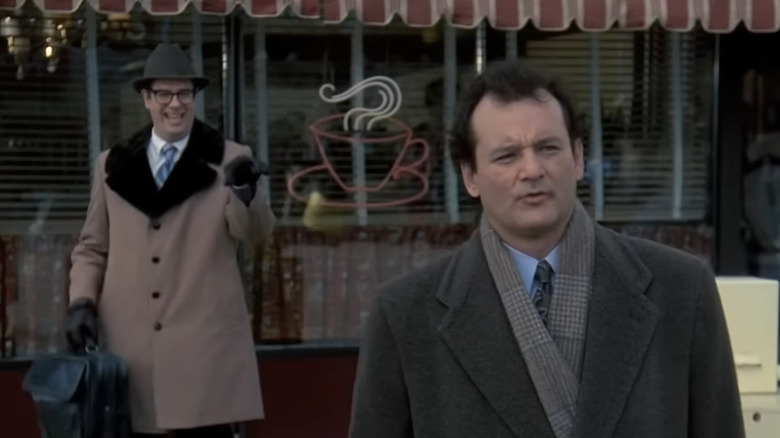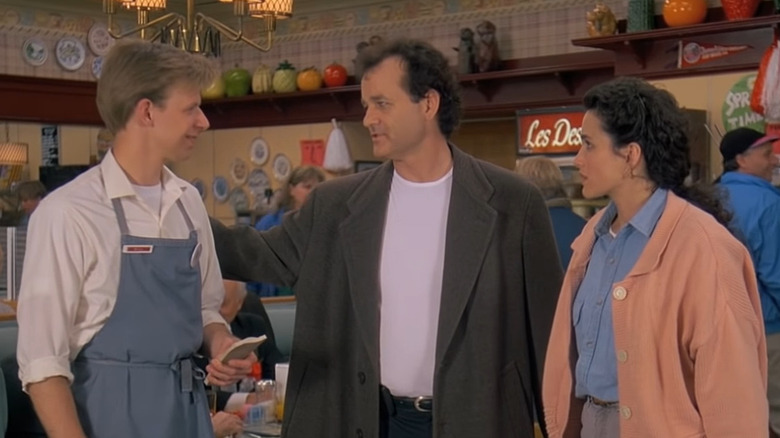This Dark Groundhog Day Theory Will Totally Change How You View The Movie
No matter how many times it's advertised as a comedy, "Groundhog Day" is a pretty scary movie. Put yourself in Phil Connors' (Bill Murray) shoes of having to relive the same day for a seemingly endless amount of time with no clear way out, and it's easy to see how horrifying the scenario is. Not making things any easier is a fan theory that suggests that Phil's nightmarish experience was brought upon him by an unlikely force.
A popular fanmade concept made the rounds on Reddit, with u/SuperConductiveRabbi taking special note of Phil's first interaction with his old colleague and insurance salesman Ned Ryerson (Stephen Tobolowsky). Here, the curmudgeon turns down Ned's persistent life insurance offer, and after stepping away from the conversation, Phil steps into a puddle leading to Ned's famous remark, "Watch out for that first step, it's a doozy!"
According to the theory, Ned isn't simply referring to Phil getting wet socks. Rather, it implies that it's the first step of Phil's' harrowing new reality, which Ned, as the devil, sent him on due to Phil's refusal to do business with him. Aiding in the evil symbolism is the fact the cafe logo behind Ned during the scene is a steaming cup of coffee drenched in red. The user suggests that Phil eventually buying Ned's insurance toward the end is ultimately what breaks the loop. Similar symbolic imagery is brought up as one of Phil's and Ned's final interactions sees them framed by a halo of light and groundhogs shaped like a cross.
It makes Phil's' story all the more tragic, as the breaking of his curse is not spurred on by his good deeds or character development, but rather by giving in and doing a deal with the devil.
Some think another character is part of the puzzle
The ever-persistent fan theory of Phil Connors' buying insurance to break his Groundhog Day curse adds a layer of meta-commentary to a movie that already has so much to say. It's an undeniably fascinating idea that viewers have not only latched on to but have gone on to mold interpretations of their own.
Redditor u/burghguy3 replied to the aforementioned thread, stating that they've always been a fan of the theory. However, the user also believes that along with Ned, the lovable news reporter Rita (Andie MacDowell) is an equally important part of the proceedings."My own head-cannon is that the 'deal with the devil' Phil makes isn't to escape the loop, it's for the love of Rita," the user stated. "Ned wants his narcissistic sense of self-importance ... By purchasing Ned's insurance, Phil is symbolically relinquishing his own ego to Ned the devil. In exchange, Phil is rewarded with the true love of another (Rita), as well as riding himself of his own parasitic narcissism." Rita's love being a motivation for Phil's drastic change of heart isn't all that surprising, but some believe she plays an even deeper role in the context of the theory.
Redditor u/Freshstocx sees Rita as the antithesis of Ned's character, commenting, "Actually, Ned is the devil, but Rita is an angel on the other side of Phil's shoulder. Rita says in the bed that maybe it's not a curse and she wished she had a thousand lives. 'It's all in how you look at it.' After that night, he begins to do good." Safe to say, without this crucial awakening, Phil's story could have ended very differently.
Others don't think Ned fits the devil archetype
While the "Groundhog Day" theory certainly has some validity, it nevertheless has its fair share of detractors. Given the ambiguous nature of the film's timeline, some fans such as u/831pm aren't convinced that buying Ned's insurance on the first go is what breaks the curse. The user noted how well Phil had gotten his timing down to react to countless other occurrences that day as a result of being caught in the loop for potentially hundreds of years and could have been buying from Ned several times by the time it ended.
Along with this, many don't think that Ned's actions are particularly devilish. Among these is u/TemptedIntoSin, who stated that the devil doesn't normally place people in impossible scenarios. "This theory implies that Ned (the devil) didn't give Phil a real choice, which imo breaks the kind of code he has between God and Devil," they commented. Ned is so far off from being a devil incarnation to some that they believe he serves the very opposite purpose.
Redditor u/LennoxMacduff94 believes that Ned is a servant of God, stating, "His offer of life insurance is more akin to an offer of protection and salvation than the normal demonic offers of immediate Earthly delights in exchange for your soul ... The time loop starts, and Phil is set onto a path that causes him to become a better person, realizing what is actually important. The improved Phil then takes the offer and is freed from the loop." Whether or not one thinks Ned is a higher power, there's no denying the fascinating nature of "Groundhog Day" as a whole.
Groundhog Day has long been subject to religious theory
Since its 1993 release, "Groundhog Day" has burned itself into the pop culture zeitgeist. Its touching story about learning to appreciate the time we have has endeared itself to countless viewers. Additionally, its surrounding time loop premise has been at the core of countless fan theories and analyses. But long before the days of Reddit, "Groundhog Day" has been a touchstone for religious analysis.
Various groups have given their interpretations of Phil Connors' story. Some Christians have drawn comparisons between the groundhog and Jesus Christ, as the creature's connection to springtime makes it a symbol of resurrection, similar to Phil's tale of renewal. Others find strong parallels between the film and Judaism in the way that Phil, rather than ascending to an unknown realm for his good deeds, is allowed to return to his life and continue working out mitzvahs, or good acts commanded by God. Meanwhile, Buddhists have found that the movie's themes line up with the concept of samsara, which centers on the idea that life is a never-ending cycle of rebirth.
The rich existential nature of "Groundhog Day" opens the door to endless examination. No matter what camp you fall under, however, you're always bound to feel as rejuvenated as Phil Connors himself after every rewatch of the beloved comedy classic.



